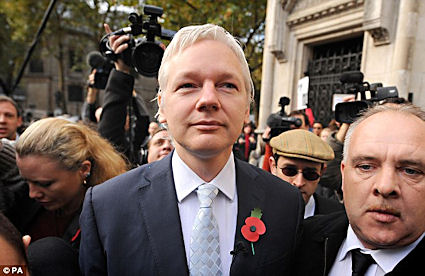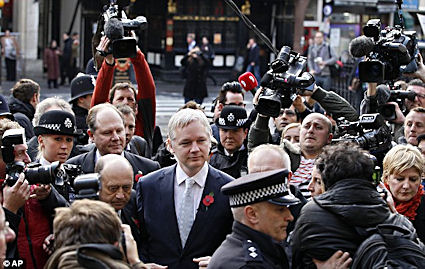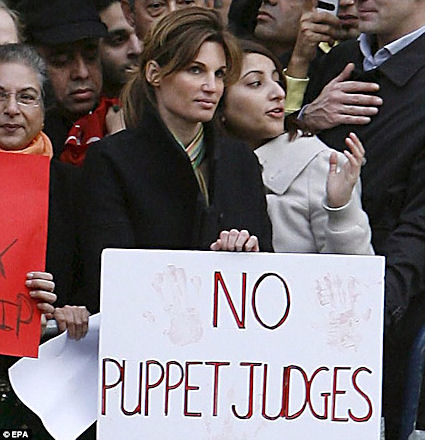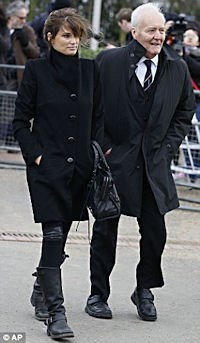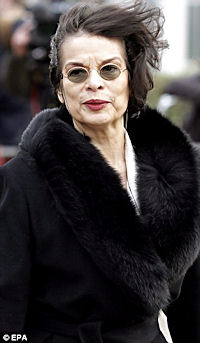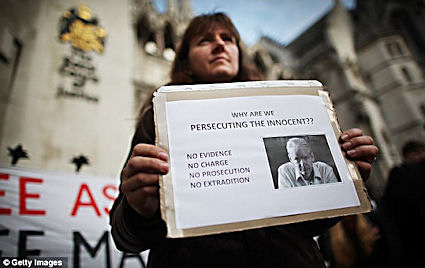Fixed to the iron railings of the court were banners reading 'Free Assange! Free Manning! End the wars'.
However, the judges ruled that the issuing of the European arrest warrant
(EAW) that led to Assange's arrest and all subsequent proceedings to
achieve extradition were 'proportionate'.
They dismissed Assange's argument that the warrant was invalid
because it had been issued by a prosecutor, and not a 'judicial
authority'.
The judges held the action of the prosecutor was subject to the
independent scrutiny of Swedish judges, 'which, as judges of another
(EU) member state, we must respect'.
The court also rejected Assange's assertion that the descriptions of
the offences were not a fair and accurate description of the conduct
alleged against him.
Bradley Manning is the detained American soldier alleged to have
leaked hundreds of thousands of US diplomatic cables to WikiLeaks.
The
judges said that any application by Assange to appeal to the Supreme
Court would be decided at a further hearing at a date to be fixed.
Assange showed no emotion and made notes while President of the Queen's Bench Division, Sir John Thomas, read out a summary of the court's reasons for its ruling.
The
Assange legal challenge, which has attracted worldwide attention,
centred on a European arrest warrant (EAW) issued by a Swedish
prosecutor which led to Assange's arrest in December last year.
His
QC, Ben Emmerson, argued at a two-day hearing in July that the
prosecutor was not a 'judicial authority' entitled to issue the EAW.
The
warrant had also contained 'fundamental misstatements' of what occurred
in Stockholm last August while Assange was in Sweden to give a lecture,
said the QC.
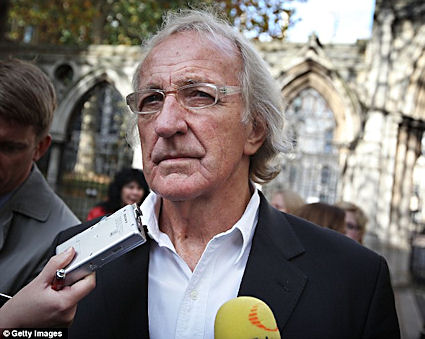 |
| One of Assange's supporters who did turn up was journalist John Pilger who is pictured talking to reporters outside the High Court
|
Assange's encounters with the two women involved consensual sex and would not be considered crimes in England, he said.
The
EAW was misleading in its accusations that he had used violence or
'acted in a manner to violate sexual integrity', said Mr Emmerson.
These 'mis-descriptions' were at odds with descriptions given by the women themselves about what had occurred.
Supporters outside the court said they were 'outraged' by the judges' decision.
Susan Gianstefani, 44, held a sign asking: 'Why are we persecuting the innocent?'
The Australian Christian worker, who had come from south London with
her husband to show her support, said: 'I think he's a hero for truth
and exposing corruption.
'I think they're out to get him - the system in general and, I think, the US and Australian governments.
'He's made a lot of enemies in high places.'
Ciaron O'Reilly, 51, said: 'We've got to stop the war and free Assange and Bradley Manning.
'Assange is probably the most amazing person in recent history who's
upset so many powerful people in such a short space of time so it's
obviously not a level playing field.'
His fans declared they would continue to give Assange their full support.
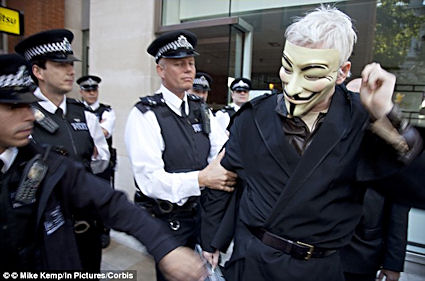 |
| Still conspicuous: Mr Assange was given a caution for wearing a mask at the Occupy London demonstration earlier this month
|
Assange burst into the public
consciousness in April 2010 when WikiLeaks released Collateral Murder -
video footage of a US air crew shooting Iraqi civilians in 2007.
The
whistleblower website, which claimed a database of 1.2 million
documents within a year of its 2006 launch, regularly hit the headlines
in 2010 with a series of leaks.
The
US Embassy cables, Afghanistan war logs and Iraq war logs, which were
drip-fed to the media in 2010, helped raise the profile of Assange.
Assange always claimed that the
allegations against him were politically motivated and linked to the
activities of the whistleblower website.
He
recently revealed that the site is at risk of closure and is suspending
its publishing operations to concentrate on fighting a financial
blockade and raising new funds.
The
stricken website is running on cash reserves after an 'arbitrary and
unlawful financial blockade' was imposed by Bank of America, Visa,
MasterCard, PayPal and Western union last December, said Assange.
